Memorie.al / On July 2, 1990, almost all foreign embassies in Tirana opened their doors to those who wanted to flee Albania. How did this happen? How could the almost forty-five-year-old fear that escape was treason, and treason was a miserable life, even for those who stayed behind, be extinguished in one night? The international constitution of embassy territories is known. They are states within states and the violation of their territories is considered a violation of borders. But surprisingly, no ambassador accredited in Tirana, whose national territory was “raped”, complained to the Albanian government about taking measures to protect the embassies?!
On the contrary. The German ambassador defended the “wounded” rebels, without accepting that they are handed over to Albanian justice. The days of embassies will also require deeper analysis with the discovery of secret documents. But the events that followed, especially the similar scenes in Cuba, etc., showed that the scenes at the embassies (someone preferred to break down the outer wall and with an old “Skoda” to bring dozens of people inside), had been staged before.
Despite the fact that by the Albanian government means of that time, these were called attacks by “hooligan gangs”, in reality, the large number of people who entered the foreign embassies that July 1990 was such that this communist term fell by itself. We still do not know who the organizers, or the initiators, as is commonly said, were. The others are all kinds of masses that can no longer be contained. Those days in the various embassies, they entered and left everywhere, defeated by the tears of mothers through the railings of the embassies), 4,795 people.
Of these, 3,163 went to Germany, 816 to Italy, 549 to France, 77 to Turkey, 52 to Poland, 51 to Czechoslovakia, 6 to Yugoslavia, 6 to Egypt, 5 to Bulgaria, etc. Later, many of them, especially those from Eastern countries, would emigrate to the USA, Canada, Australia and elsewhere. The latest data shows that Albanians have also arrived in Iran, New Zealand, and Argentina.
July 2 has now become a date to commemorate the boys and girls, women and children, who sought the temples of hope, entering foreign embassies, because on this very date a fierce clash took place between ordinary people and the police structures of the dictatorship.
In fact…!
The entry into the embassies had begun twelve days earlier, on June 20, when the accordion bus, with the license plate TR 00301, driven by the driver Bujar Alikaj, stopped by chance near the walls of the Greek embassy. Then, on June 23, a “Skoda” – LIAZ – driven by Fatos Kaceli, blew up the gate of the Italian embassy, while the next day, at around 6:00 p.m., a “Skoda” driven by Kastriot Mano, tore through the wall of the German embassy, collapsing it. After June 20, until July 6, there were wall breaches in almost all foreign embassies, with the Turkish embassy breached by a garbage truck being singled out as something of a spectacle.
Apart from the Chinese and Cuban embassies, which did not receive the guests, it must be said that all the other embassies reflected a generosity and hospitality that should not be forgotten by today’s Albanian politics. Entry through embassies also continued after July 2, but this entry was easily done under the observation of the police, who for several days in a row had been ordered not to react anymore.
What happened after the Popajs
After the legendary Popeyes of the Italian embassy, the first attempt to scale the walls was made at the Greek and German embassies. The first to attempt to scale the walls of the Greek embassy was a resident of Narta, Vlorë, whom the police managed to catch just as he was preparing to find the fatal tangent of the wall’s height, and by pulling him by force, after laying him on the ground, they struck him violently with punches and kicks, until he fainted.
Even today, the name of the man from Narta, Vlorë, for whom the wall he had dreamed of as a limit of salvation, suddenly turned into a prison cell or, in a shooting wall, has not yet been made public. Also, a group attempt to enter the German embassy had failed. It should be noted that in those days, it was said that “a man was able to enter the French embassy”, but this circulated in the form of a legend, without ever being confirmed exactly. During this ten-day period, several other embassies were also targeted on more suitable routes, but without result.
The first strike, June 20
The accordion bus with the license plate TR 00301, driven by 30-year-old Bujar Alikaj, on June 20, 1990, at 07:40, after having taken the women workers of Genio to work, headed for the Greek embassy, stopping at its side wall. Inside, in addition to Bujar, was also Edmond Vokshi, who after an attempt to cross the border in Tropoja, together with his pregnant wife and young son, was sentenced to ten years in prison. While the woman to correctional labor. After opening the top lid of the bus, they crossed the surrounding wall, thus becoming the first two inhabitants of the previously forbidden cosmos.
On June 28, Mondi’s wife and children entered the embassy. But how was the entry operation prepared? “A day earlier, I had met with Leonidha (the embassy’s security chief) at the ‘Dajti’ hotel, where I had predicted my final destination for the second time. After having previously met her at the swimming pools, – says Bujari. – In this second meeting, Leonidha told me that; ‘to hand you over, we will never hand you over, but the date of your departure will depend on the circumstances of subsequent developments’. So, the next day, upon arriving at the embassy, the two young men contacted the staff and everything was arranged within a few minutes.
“Meanwhile, two other young men, Ardi and Bimi, crossed from the territory of the German embassy, who after crossing the German’s perimeter wall, jumped back to the Greek one, – he says. – The German ambassador arrived immediately at the Greek embassy, telling us that whoever wanted to stay with him could come immediately, but we were promised good conditions, housing and work at the Greek embassy as soon as we arrived. So we all stayed there”.
Meanwhile, in the capital, this event caused an extraordinary stir, both among ordinary people and in government institutions. It is remembered that at the People’s Theater, while the poster presenting the performance of a new comedy was being put up, one of the most famous actresses in the country, Eva Alikaj, said loudly to the organizers: “Remove the comedy poster altogether, because now all Albanians are suffering their black fate and they cannot be forced to laugh in front of this situation”.
The unbelievable at the German embassy!
Without giving the state structures a breath to organize, on July 2, the wall of the German embassy collapsed from a “Skoda” in which there were about 20 people, men, women and children. In front of the car, sandbags had been placed, while on top of it, in the form of preliminary food, they had also taken some sheep. Although everything was planned with detail, it happened that the surrounding wall was not a single brick wall, but a double one. So after his attack, many of those present were bleeding on their faces and bodies.
Thus bleeding, they jumped over the collapsed wall, thus marking a new milestone for the collapse of the dictatorship. It must be said that inside the embassy, there was a group of young people, since Ivi, together with his friends, had jumped over the wall before. But…! At the Turkish embassy, the escape was carried out in a spectacular way, through a garbage truck.
Cleaning up the city’s garbage, people dressed as municipal workers landed at the Turkish embassy, marking a new surprise. Then, together with other newcomers who had entered earlier, Koli, Mondi, Ganiu, Fredi, Ardi etc., they received transit visas for Greece and on the last night, they slept at the “Arbëria” hotel, where they did not sleep a wink while waiting for breakfast.
The rare day of July 2, 1990…!
The entry on July 2 was carried out in the evening hours, through a real fight between people who wanted to flee and the police forces, who had taken the task of stopping the entry to the embassy with weapons. In this fight there were also many injured, but there are also rumors of an enigmatic number of dead. On the other hand, the police arrested various participants and put them in cars, which rushed through the streets, but even today, no one knows their destination!
“I watched this real war from the railings of the Greek embassy and I can say that people were injured by police fire or were physically hit with punches and kicks, then loaded into military vehicles of the ‘IFA’ type, but I don’t know where they ended up,” says a representative of the diplomatic corps. In testimony, it should be added that two secret police cameramen filmed all the faces of the participants in this fight.
The days that followed…!
Another order was given, by which all those who wanted to enter were completely free to do so. Even under the eyes of the police, people climbed up and down from the railings, returning home to have lunch or to leave some message for other family members. There were also cases when people who passed by by chance, without any desire to enter the embassies, were harassed by the respective policeman: “If you want to enter, jump over the side of the wall”.
Extraordinary crowd and…!
There was an extraordinary crowd at the embassies. Understandably, the difficulty was greater in supplying food, but those embassies where there was a more limited number, the conditions were considered more comfortable. Thus, at the German and Italian embassies, there were more problems in distributing food, but it must be said that the dedication of the remaining personnel (a large part of the embassy employees had left) was at its maximum level.
While in the Turkish, French, Greek, Czech embassies, etc., it was easier to cope with the transition of the reception and sometimes it happened that the refugees of the Greek embassy helped their relatives in the neighboring embassy with cigarettes, food, etc., but this only happened for a while, because then they wouldn’t let us in anymore” – says Edmondi. The day was certainly easier to get through, but the night was more difficult. It happened that at night the Albanian secret police would climb the railings of the embassy and speak individually to the people staying there.
“Arben’s mother has died”, “Iliri has a sick sister”, or “Get out, because they have decided to make soap for you, just like they used to do in the concentration camps” etc., etc. In addition, sometimes the people of the house would come, encouraged by the state, who would call on the relatives to leave? In all cases we were determined to stay, but there were some who also left for various reasons, – says Edmondi.
On the day of the grand final
The final match between Germany and Argentina, for the first time in the sports-loving capital of Albania, was followed with little interest in the families. People’s voices were completely distracted by the latest developments and very few were thinking about football. When the Germans scored a goal, here and there a shout of enthusiasm was heard, because the capital was living its most difficult hours. But it was precisely from the German embassy that the voices of the isolated ones suddenly rang out, shouting; “Germany, Germany”.
And at the moment of the goal, this enthusiasm reached its peak. Then the people living in the center came out into the streets and, more than the football match, listened to the cries of the isolated, in the vain hope that they could distinguish the voices of their relatives. That day, the entire Albanian capital was with the German team, just as much as it could have been with Italy, Greece, France, the Czech Republic, Turkey, etc., if they were to play in the final.
With eyes on the homeland!
In the morning, before dawn on July 13, the buses were loaded with refugees heading towards Durrës. Other people, family or relatives, had blocked the sidewalks of the Kombinat-Plepa road, waiting for the end of the puzzle, but suddenly an order was given for the buses to pass by the other road towards Durrës, bypassing Lapraka. Despite this entire detour, even those parts of the road were packed with relatives of the refugees. In Maminas, the buses stopped for about a quarter of an hour…!
During this flight, the refugees took off their T-shirts, watches, rings, etc., which they threw on the road with a simple inscription, such as “To my mother in memory”, also writing an address. Sometimes they say that in Tirana, where theft and robbery exist everywhere, if you lose something, you never find it again. But that day was completely different. On that day when the nation had lost part of its conscience, other items or gold, had no value.
That day nothing was lost, because all the items arrived within the day, at the destinations they addressed. People knocking on doors to bring back found items whispered the words with tears in their eyes: “I was looking for a sign of my son, but I found a letter from your son and, clutching it to my chest, I cried as if for my own children.” They were leaving their homeland with tears in their eyes! / Memorie.al




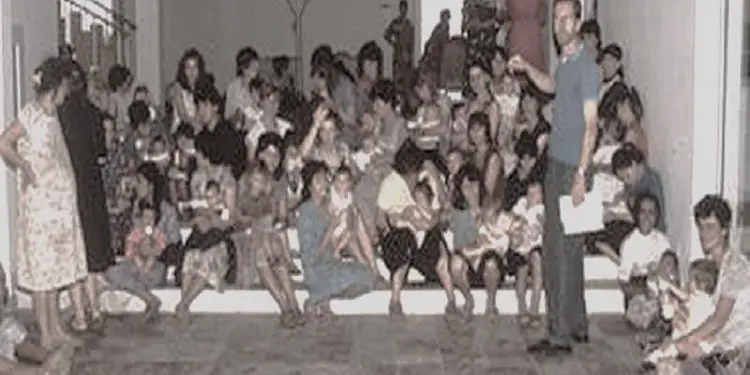
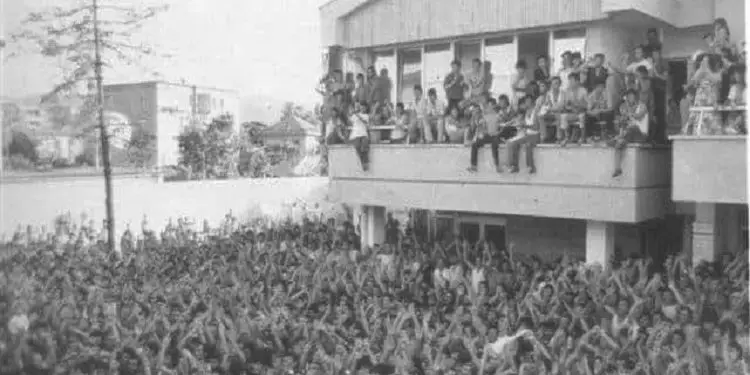
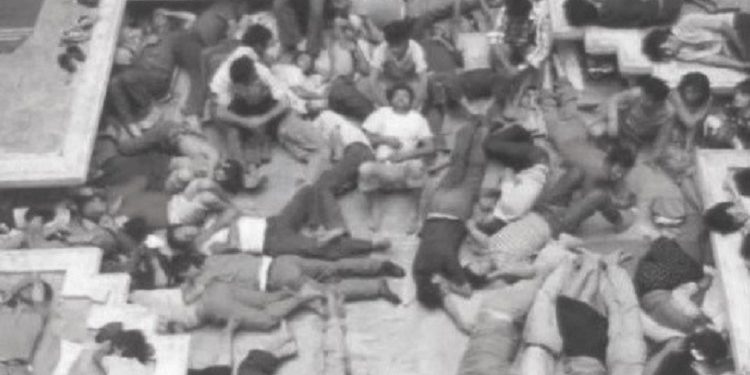
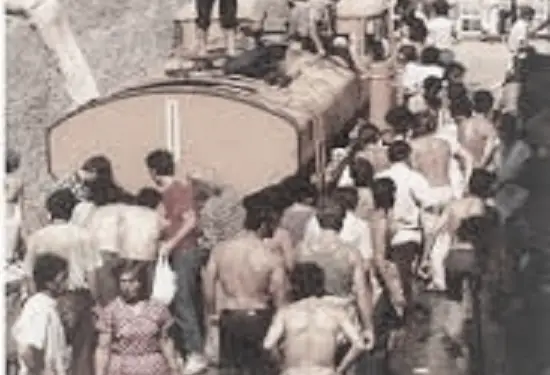
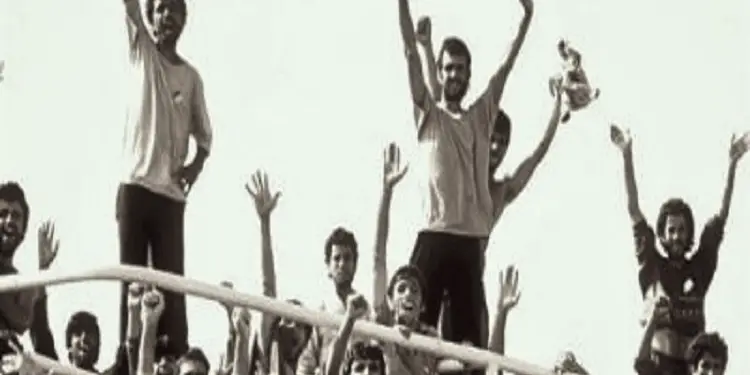
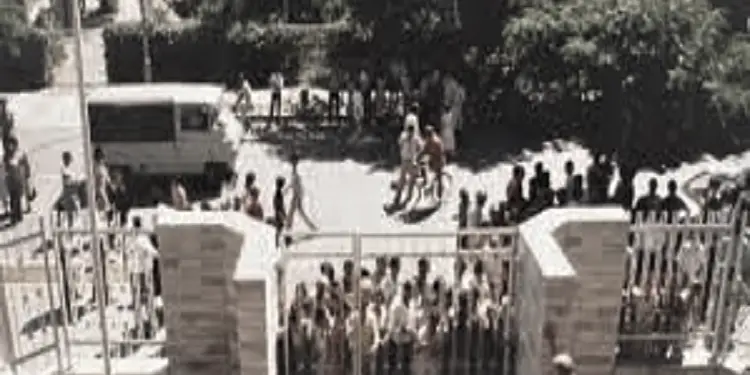
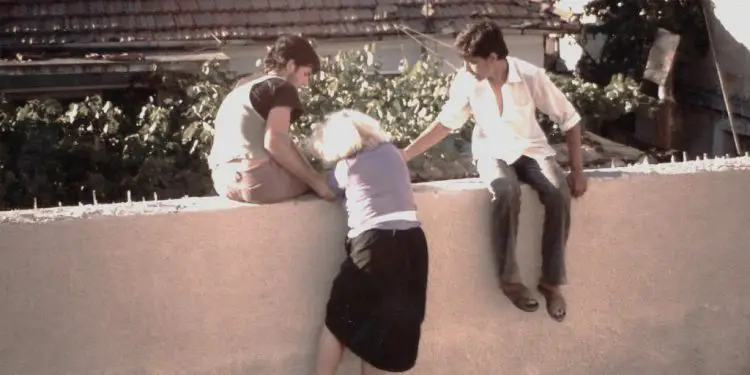
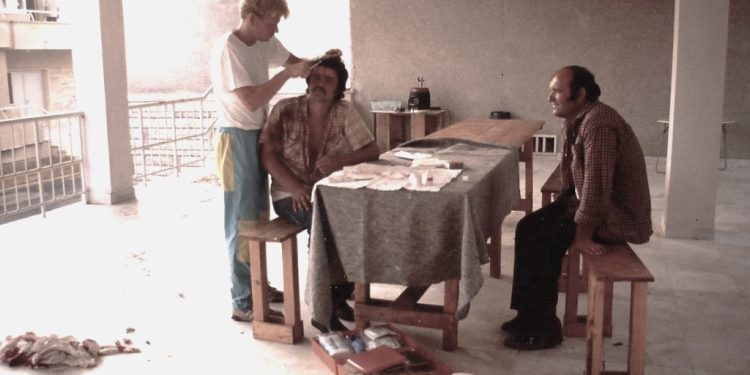
![“The ensemble, led by saxophonist M. Murthi, violinist M. Tare, [with] S. Reka on accordion and piano, [and] saxophonist S. Selmani, were…”/ The unknown history of the “Dajti” orchestra during the communist regime.](https://memorie.al/wp-content/uploads/2026/02/admin-ajax-3-350x250.jpg)
![“In an attempt to rescue one another, 10 workers were poisoned, but besides the brigadier, [another] 6 also died…”/ The secret document of June 11, 1979, is revealed, regarding the deaths of 6 employees at the Metallurgy Plant.](https://memorie.al/wp-content/uploads/2026/02/maxresdefault-350x250.jpg)




